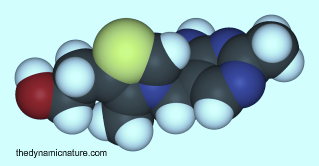Vitamin B1 (Thiamine) and beribery
Vitamin B1 (thiamine) is water-soluble essential micronutrient belonging to vitamin B-complex group.
Thiamine is available from both animal and plant sources.
In human body thiamine exists in three forms namely, thiamine monophosphate,
thiamine pyrophosphate
and thiamine triphosphate.
Like most of the B vitamins thiamine is essential for production of energy by metabolism of fats,
proteins and carbohydrates.
Adenosine triphosphate (ATP) is required by every cell in the body for energy production and
thiamine helps in
the formation of ATP.

Thiamine molecule
Thiamine helps in biosynthetic reactions and in the nucleic acids synthesis.
By keeping the heart muscle healthy ,thiamine protects us from cardiovascular problems.
Thiamine is very essential for the health of the brain and the
nervous system.
For the healthy digestive process and the secretion of
hydrochloric acid vitamin B1 is very necessary.
Thiamine helps in alleviating conditions like arthritis, infertility and some forms of diabetes.
Deficiency and Beriberi
The absorption of vitamin B1 is inter-related to the availably of enough of folic acid,
vitamin B12 and vitamin B6.
Smoking and consumption of alcohol appears to interfere with the absorption of thiamine.
Vitamin B1 is lost on refrigeration and continuous consumption of refrigerated
food only, can cause its deficiency.
Mild deficiency of thiamine causes digestive problems, irritability, dementia, loss of
appetite and fatigue.
A higher degree of
deficiency leads to nervous disorders.
Severe deficiency of thiamine
causes a condition called Beriberi.
Depending upon the affected system and severity this disease is called dry, wet or cerebral beriberi.
Dry beriberi shows peripheral neuropathy. Burning feet sensation, weakness in the limbs, muscle pain, abnormal
reflexes and seizures are the symptoms of dry beriberi.
In wet beriberi apart from the above symptoms, enlargement and
oedema of the heart occurs which can lead to
heart failure.
In cerebral beriberi the central nervous system is also affected. Loss of memory, gait disorders and brain damage
are the results in very severe deficiency of vitamin B1.
Toxicity
Toxicity of thiamine is very rare as excess of this vitamin is lost in the urine. On use of high doses mild stomach irritation is reported.
Sources
Bran part of the cereals and grains contains most of the vitamin B1
available in them.
Hence whole grains without polishing them are good sources.
Milk and milk products, seeds and nuts, vegetables, fruits like orange, raisins, peas, fish, meat, egg and poultry
are good sources of vitamin B1.
|
| |||
|
| |||
|
| |||
|
| |||
|
| |||
|
| |||
|
| |||
|
|
|||
Google+ page
By Mahmood Syed Faheem
Advertisement
Disclaimer: Not professional advice - The above content is just for informational & educational purpose only If you need specific medical advice please seek a professional doctor who is licensed or knowledgeable in that area.